小学英语常见形容词及比较级、最高级变化一览表
- 格式:doc
- 大小:32.50 KB
- 文档页数:10
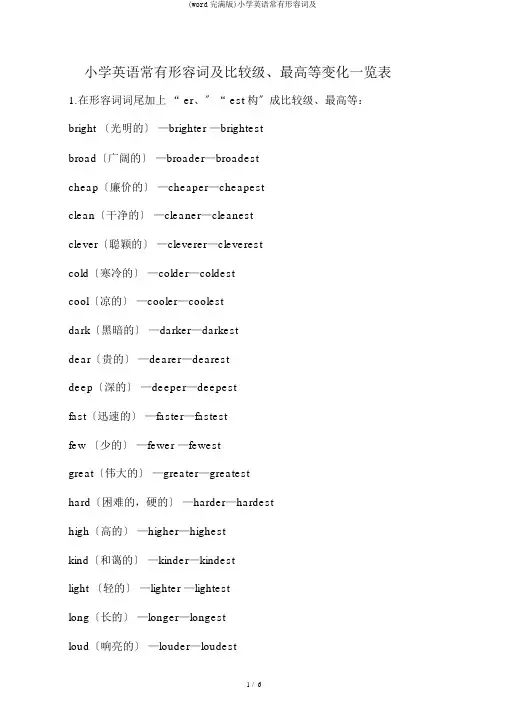
小学英语常有形容词及比较级、最高等变化一览表1.在形容词词尾加上“ er、〞“ est构〞成比较级、最高等:bright 〔光明的〕—brighter —brightestbroad〔广阔的〕—broader—broadestcheap〔廉价的〕—cheaper—cheapestclean〔干净的〕—cleaner—cleanestclever〔聪颖的〕—cleverer—cleverestcold〔寒冷的〕—colder—coldestcool〔凉的〕—cooler—coolestdark〔黑暗的〕—darker—darkestdear〔贵的〕—dearer—dearestdeep〔深的〕—deeper—deepestfast〔迅速的〕—faster—fastestfew 〔少的〕—fewer —fewestgreat〔伟大的〕—greater—greatesthard〔困难的,硬的〕—harder—hardesthigh〔高的〕—higher—highestkind〔和蔼的〕—kinder—kindestlight 〔轻的〕—lighter —lightestlong〔长的〕—longer—longestloud〔响亮的〕—louder—loudestnear〔近的〕—nearer—nearestnew〔新的〕—newer—newestpoor〔穷的〕—poorer—poorestquick〔快的〕—quicker—quickestquiet 〔沉寂的〕—quieter—quietestrich 〔丰饶的〕—richer—richestshort 〔短的〕—shorter —shortestslow〔慢的〕—slower—slowestsmall〔小的〕—smaller—smallestsmart〔聪颖的〕—smarter—smartestsoft 〔娇嫩的〕—softer —softeststrong〔强壮的〕—stronger—strongestsweet〔甜的〕—sweeter—sweetesttall 〔高的〕 -taller-tallestthick〔厚的〕—thicker—thickestwarm 〔温暖的〕—warmer—warmestweak〔弱的〕—weaker—weakestyoung〔年轻的〕—younger—youngest2.双写最后一个字母,再加上“ er、〞“ est构〞成比较级、最高等: big〔大的〕—bigger—biggesthot 〔热的〕—hotter —hottestred〔红的〕—redder—reddestsad〔伤心的〕—sadder—saddestthin 〔瘦的〕—thinner —thinnestwet 〔湿的〕—wetter —wettestmad〔疯的〕—madder—maddest3.以不发音的字母 e 结尾的形容词,加上“ r、〞“ st构〞成比较级、最高等:able〔能干的〕—abler—ablestbrave〔勇敢的〕—braver—bravestclose〔凑近的〕—closer—closestfine 〔好的,圆满的〕—finer —finestlarge〔巨大的〕—larger—largestlate 〔迟的〕—later —latestnice〔好的〕—nicer—nicestripe〔成熟的〕—riper—ripestrude〔莽撞的〕—ruder—rudestsafe〔安全的〕—safer—safeststrange〔奇怪的〕—stranger—strangestwide〔宽广的〕—wider —widestwise〔睿智的,聪颖的〕—wiser—wisestwhite 〔白的〕—whiter —whitest4.以字母 y 结尾的形容词,把 y 改为 i,再加上“ er、〞“ est构〞成比较级、最高等:busy〔忙碌的〕—busier—busiestdirty 〔脏的〕—dirtier —dirtiestdry〔无聊的〕—drier—driestearly〔早的〕—earlier—earliesteasy〔简单的〕—easier—easiestfriendly 〔友好的〕—friendlier —friendliestfunny〔好玩的〕—funnier —funniesthappy〔快乐的〕—happier—happiesthealthy〔健康的〕—healthier —healthiestheavy〔重的〕—heavier—heaviesthungry〔饿的〕—hungrier—hungriestlazy〔懒散的〕—lazier—laziestlucky〔好运的〕—luckier—luckiestnaughty〔俏皮的〕—naughtier—naughtiestnoisy〔喧杂的〕—noisier—noisiestpretty 〔美丽的〕—prettier —prettiestsilly〔傻的〕—sillier—silliestspicy〔辣的〕—spicier—spiciestthirsty 〔渴的〕—thirstier —thirstiestugly〔丑的〕—uglier—ugliest5.双音节、多音节形容词,在单词前面加上“ more、〞“ most构〞成比较级、最高等:afraid〔害怕的〕—more afraid—most afraidbeautiful 〔美丽的〕—more beautiful —most beautifulcareful〔仔细的〕—more careful—most carefulcheerful 〔快乐的〕—more cheerful—most cheerfulcrowded〔拥挤的〕—more crowded—most crowdeddangerous〔危险的〕—more dangerous—most dangerousdelicious〔美味的〕—more delicious—most deliciousdifficult 〔困难的〕—more difficult —most difficultexciting〔令人愉悦的〕—more exciting—most excitingexpensive〔昂贵的〕—more expensive—most expensivefamous〔出名的〕—more famous—most famousfrightened 〔惊讶的〕—more frightened —most frightenedfrightening 〔令人害怕的〕—more frightening —most frighteninghard-working 〔勤奋的〕—more hard-working—most hard-workinghelpful 〔有帮助的〕—more helpful —most helpfulhonest〔老实的〕—more honest—most honestimportant 〔重要的〕—more important —most importantinteresting 〔幽默的〕—more interesting —most interestingpolite 〔有礼貌的〕—more polite —most politeterrible 〔可怕的〕—more terrible —most terrible tired 〔累的〕—more tired —most tired6.不规那么变化的形容词:bad〔坏的〕—worse—worstfar〔远的〕—farther —farthest (far —further —furthest) good〔好的〕—better —bestill〔病的〕—worse—worstlittle 〔少的〕—less—leastmany〔多的〕—more —mostmuch〔多的〕—more —mostold〔年老的〕—older —oldest ( old—elder—eldest) well 〔好的,身体好的〕—better —best。
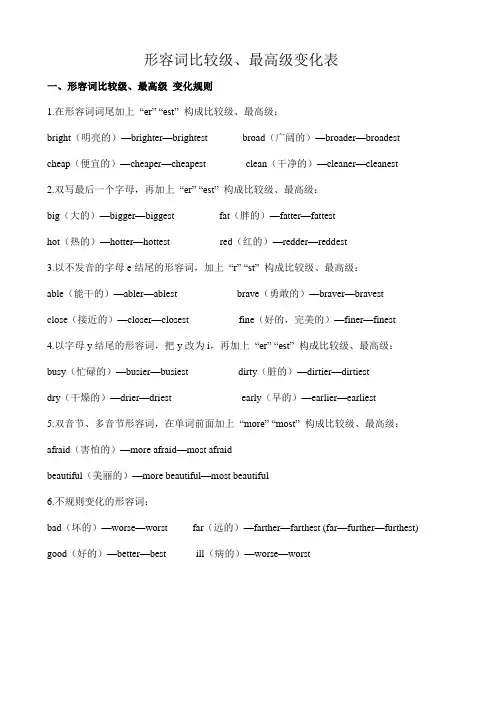
形容词比较级、最高级变化表一、形容词比较级、最高级变化规则1.在形容词词尾加上“er” “est” 构成比较级、最高级:bright(明亮的)—brighter—brightest broad(广阔的)—broader—broadest cheap(便宜的)—cheaper—cheapest clean(干净的)—cleaner—cleanest2.双写最后一个字母,再加上“er” “est” 构成比较级、最高级:big(大的)—bigger—biggest fat(胖的)—fatter—fattesthot(热的)—hotter—hottest red(红的)—redder—reddest3.以不发音的字母e结尾的形容词,加上“r” “st” 构成比较级、最高级:able(能干的)—abler—ablest brave(勇敢的)—braver—bravestclose(接近的)—closer—closest fine(好的,完美的)—finer—finest4.以字母y结尾的形容词,把y改为i,再加上“er” “est” 构成比较级、最高级:busy(忙碌的)—busier—busiest dirty(脏的)—dirtier—dirtiestdry(干燥的)—drier—driest early(早的)—earlier—earliest5.双音节、多音节形容词,在单词前面加上“more” “most” 构成比较级、最高级:afraid(害怕的)—more afraid—most afraidbeautiful(美丽的)—more beautiful—most beautiful6.不规则变化的形容词:bad(坏的)—worse—worst far(远的)—farther—farthest (far—further—furthest) good(好的)—better—best ill(病的)—worse—worst二、形容词比较级和最高级句型(特殊)比较级句型:1.在形容词比较级前还可以用much, even, still, a little,……来修饰,表示“……的多”,“甚至……”,“更……”,“……一些”。
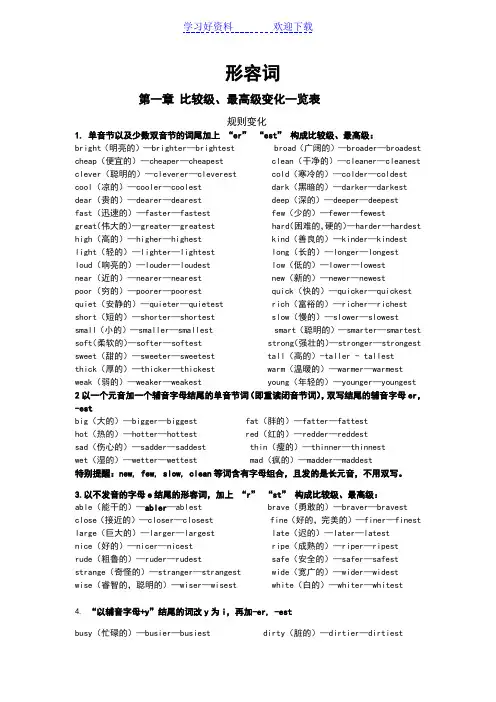
形容词第一章比较级、最高级变化一览表规则变化1.单音节以及少数双音节的词尾加上“er”“est”构成比较级、最高级:bright(明亮的)—brighter—brightest broad(广阔的)—broader—broadestcheap(便宜的)—cheaper—cheapest clean(干净的)—cleaner—cleanest clever(聪明的)—cleverer—cleverest cold(寒冷的)—colder—coldestcool(凉的)—cooler—coolest dark(黑暗的)—darker—darkestdear(贵的)—dearer—dearest deep(深的)—deeper—deepestfast(迅速的)—faster—fastest few(少的)—fewer—fewestgreat(伟大的)—greater—greatest hard(困难的,硬的)—harder—hardesthigh(高的)—higher—highest kind(善良的)—kinder—kindestlight(轻的)—lighter—lightest long(长的)—longer—longestloud(响亮的)—louder—loudest low(低的)—lower—lowestnear(近的)—nearer—nearest new(新的)—newer—newestpoor(穷的)—poorer—poorest quick(快的)—quicker—quickestquiet(安静的)—quieter—quietest rich(富裕的)—richer—richestshort(短的)—shorter—shortest slow(慢的)—slower—slowestsmall(小的)—smaller—smallest smart(聪明的)—smarter—smartestsoft(柔软的)—softer—softest strong(强壮的)—stronger—strongestsweet(甜的)—sweeter—sweetest tall(高的)-taller - tallest thick(厚的)—thicker—thickest warm(温暖的)—warmer—warmestweak(弱的)—weaker—weakest young(年轻的)—younger—youngest2以一个元音加一个辅音字母结尾的单音节词(即重读闭音节词),双写结尾的辅音字母er,-estbig(大的)—bigger—biggest fat(胖的)—fatter—fattesthot(热的)—hotter—hottest red(红的)—redder—reddestsad(伤心的)—sadder—saddest thin(瘦的)—thinner—thinnestwet(湿的)—wetter—wettest mad(疯的)—madder—maddest特别提醒:new, few, slow, clean等词含有字母组合,且发的是长元音,不用双写。
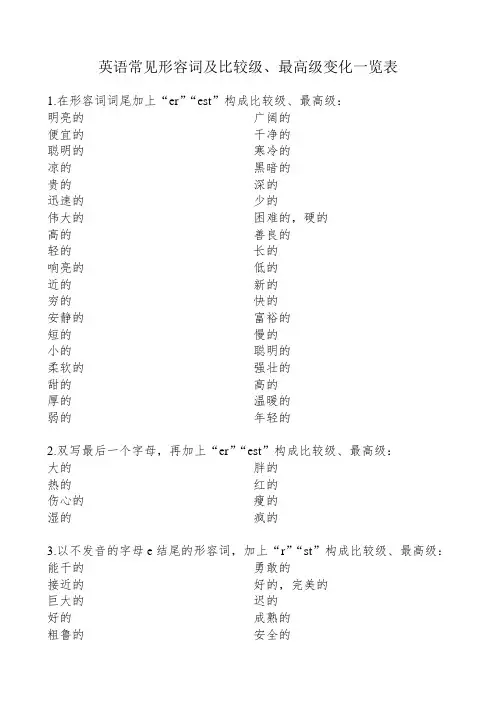
英语常见形容词及比较级、最高级变化一览表
1.在形容词词尾加上“er”“est”构成比较级、最高级:
明亮的广阔的
便宜的干净的
聪明的寒冷的
凉的黑暗的
贵的深的
迅速的少的
伟大的困难的,硬的
高的善良的
轻的长的
响亮的低的
近的新的
穷的快的
安静的富裕的
短的慢的
小的聪明的
柔软的强壮的
甜的高的
厚的温暖的
弱的年轻的
2.双写最后一个字母,再加上“er”“est”构成比较级、最高级:
大的胖的
热的红的
伤心的瘦的
湿的疯的
3.以不发音的字母e结尾的形容词,加上“r”“st”构成比较级、最高级:能干的勇敢的
接近的好的,完美的
巨大的迟的
好的成熟的
粗鲁的安全的
奇怪的宽广的
睿智的,聪明的白的
4.以字母y结尾的形容词,把y改为i,再加上“er”“est”构成比较级、最高级:
忙碌的脏的
干燥的早的
容易的友好的
好玩的开心的
健康的有钱的
饿的懒惰的
幸运的调皮的
嘈杂的美丽的
傻的辣的
渴的丑的
重的
5.双音节、多音节形容词,在单词前面加上“more”“most”构成比较级、最高级:
害怕的
美丽的
仔细的
开心的
拥挤的
危险的
美味的
困难的
令人兴奋的
昂贵的
著名的
受惊的
令人害怕的
勤奋的
有帮助的
诚实的
重要的
有趣的
有礼貌的
可怕的
累的
6.不规则变化的形容词
坏的远的好的病的少的多的多的年老的好的,身体好的。
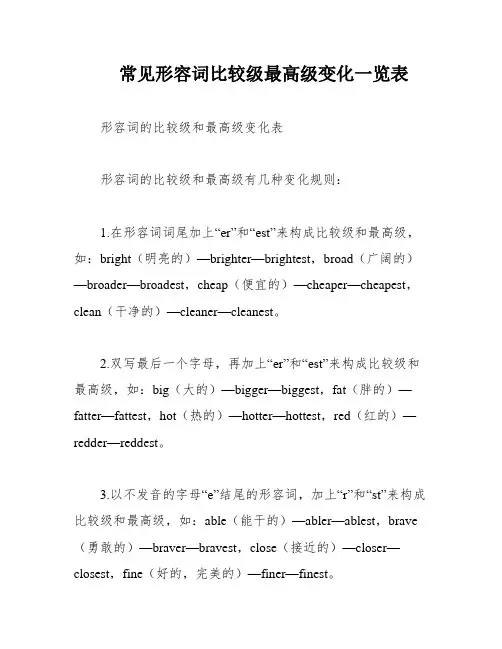
常见形容词比较级最高级变化一览表形容词的比较级和最高级变化表形容词的比较级和最高级有几种变化规则:1.在形容词词尾加上“er”和“est”来构成比较级和最高级,如:bright(明亮的)—brighter—brightest,broad(广阔的)—broader—broadest,cheap(便宜的)—cheaper—cheapest,clean(干净的)—cleaner—cleanest。
2.双写最后一个字母,再加上“er”和“est”来构成比较级和最高级,如:big(大的)—bigger—biggest,fat(胖的)—fatter—fattest,hot(热的)—hotter—hottest,red(红的)—redder—reddest。
3.以不发音的字母“e”结尾的形容词,加上“r”和“st”来构成比较级和最高级,如:able(能干的)—abler—ablest,brave (勇敢的)—braver—bravest,close(接近的)—closer—closest,fine(好的,完美的)—finer—finest。
4.以字母“y”结尾的形容词,把“y”改为“i”,再加上“er”和“est”来构成比较级和最高级,如:busy(忙碌的)—busier—busiest,dirty(脏的)—dirtier—dirtiest,dry(干燥的)—drier—driest,early(早的)—earlier—earliest。
5.双音节、多音节形容词,在单词前面加上“more”和“most”来构成比较级和最高级,如:afraid(害怕的)—more afraid—most afraid,beautiful(美丽的)—more beautiful—most beautiful。
6.不规则变化的形容词有:bad(坏的)—worse—worst,far(远的)—farther—farthest(far—further—furthest),good (好的)—better—best,ill(病的)—worse—worst。
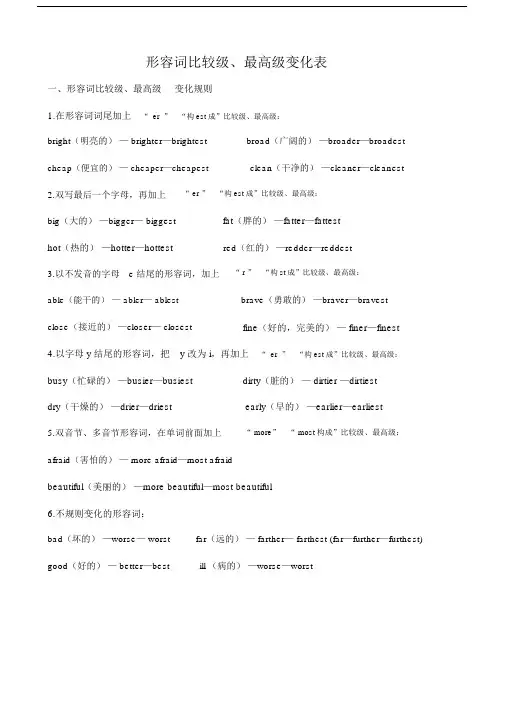
形容词比较级、最高级变化表一、形容词比较级、最高级变化规则1.在形容词词尾加上“ er” “构est成”比较级、最高级:bright(明亮的)— brighter—brightest broad(广阔的)—broader—broadest cheap(便宜的)— cheaper—cheapest clean(干净的)—cleaner—cleanest 2.双写最后一个字母,再加上“ er ” “构est成”比较级、最高级:big(大的)—bigger— biggest fat(胖的)—fatter—fattesthot(热的)—hotter—hottest red(红的)—redder—reddest3.以不发音的字母 e 结尾的形容词,加上“ r ” “构st成”比较级、最高级:able(能干的)— abler— ablest brave(勇敢的)—braver—bravest close(接近的)—closer— closest fine(好的,完美的)— finer—finest 4.以字母 y 结尾的形容词,把y 改为 i,再加上“ er” “构est成”比较级、最高级:busy(忙碌的)—busier—busiestdry(干燥的)—drier—driest5.双音节、多音节形容词,在单词前面加上dirty(脏的)— dirtier —dirtiest early(早的)—earlier—earliest“ more” “ most构成”比较级、最高级:afraid(害怕的)— more afraid—most afraidbeautiful(美丽的)—more beautiful—most beautiful6.不规则变化的形容词:bad(坏的)—worse— worst far(远的)— farther— farthest (far—further—furthest) good(好的)— better—best ill (病的)—worse—worst二、形容词比较级和最高级句型(特殊)比句型:1.在形容比前可以用 much, even, still, a little,⋯⋯来修,表示“⋯⋯的多”,“甚至⋯⋯”,“更⋯⋯”,“⋯⋯一些”。
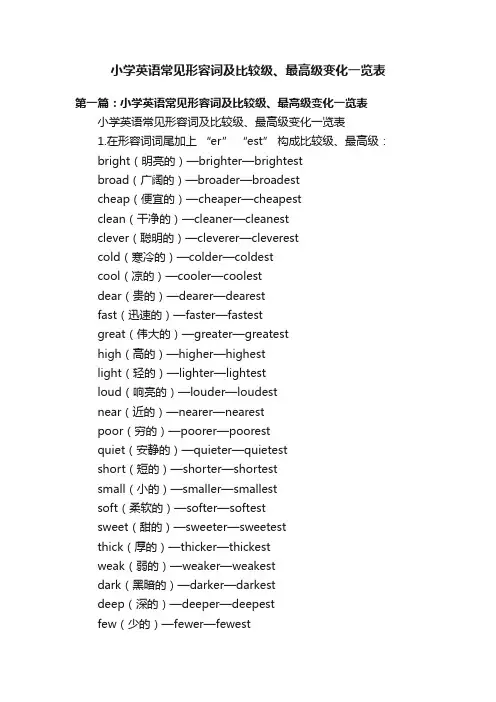
小学英语常见形容词及比较级、最高级变化一览表第一篇:小学英语常见形容词及比较级、最高级变化一览表小学英语常见形容词及比较级、最高级变化一览表1.在形容词词尾加上“er” “est” 构成比较级、最高级:bright(明亮的)—brighter—brightestbroad(广阔的)—broader—broadestcheap(便宜的)—cheaper—cheapestclean(干净的)—cleaner—cleanestclever(聪明的)—cleverer—cleverestcold(寒冷的)—colder—coldestcool(凉的)—cooler—coolestdear(贵的)—dearer—dearestfast(迅速的)—faster—fastestgreat(伟大的)—greater—greatesthigh(高的)—higher—highestlight(轻的)—lighter—lightestloud(响亮的)—louder—loudestnear(近的)—nearer—nearestpoor(穷的)—poorer—poorestquiet(安静的)—quieter—quietestshort(短的)—shorter—shortestsmall(小的)—smaller—smallestsoft(柔软的)—softer—softestsweet(甜的)—sweeter—sweetestthick(厚的)—thicker—thickestweak(弱的)—weaker—weakestdark(黑暗的)—darker—darkestdeep(深的)—deeper—deepestfew(少的)—fewer—fewesthard(困难的,硬的)—harder—hardestkind(善良的)—kinder—kindestlong(长的)—longer—longestlow(低的)—lower—lowestnew(新的)—newer—newestquick(快的)—quicker—quickestrich(富裕的)—richer—richestslow(慢的)—slower—slowestsmart(聪明的)—smarter—smarteststrong(强壮的)—stronger—strongesttall(高的)-taller-tallestwarm(温暖的)—warmer—warmestyoung(年轻的)—younger—youngest2.双写最后一个字母,再加上“er” “est” 构成比较级、最高级:big(大的)—bigger—biggestfat(胖的)—fatter—fattesthot(热的)—hotter—hottestred(红的)—redder—reddestsad(伤心的)—sadder—saddestthin(瘦的)—thinner—thinnestwet(湿的)—wetter—wettestmad(疯的)—madder—maddest3.以不发音的字母e结尾的形容词,加上“r” “st” 构成比较级、最高级:able(能干的)—abler—ablestbrave(勇敢的)—braver—bravestclose(接近的)—closer—closestfine(好的,完美的)—finer—finestlarge(巨大的)—larger—largestlate(迟的)—later—latestnice(好的)—nicer—nicestripe(成熟的)—riper—ripestrude(粗鲁的)—ruder—rudestsafe(安全的)—safer—safeststrange(奇怪的)—stranger—strangestwide(宽广的)—wider—widestwise(睿智的,聪明的)—wiser—wisestwhite(白的)—whiter—whitest4.以字母y结尾的形容词,把y改为i,再加上“er” “est” 构成比较级、最高级:busy(忙碌的)—busier—busiestdirty(脏的)—dirtier—dirtiestdry(干燥的)—drier—driestearly(早的)—earlier—earliesteasy(容易的)—easier—easiestfriendly(友好的)—friendlier—friendliestfunny(好玩的)—funnier—funniesthappy(开心的)—happier—happiesthealthy(健康的)—healthier—healthiestheavy(重的)—heavier—heaviesthungry(饿的)—hungrier—hungriestlazy(懒惰的)—lazier—laziestlucky(幸运的)—luckier—luckiestnaughty(调皮的)—naughtier—naughtiestnoisy(嘈杂的)—noisier—noisiestpretty(美丽的)—prettier—prettiestsilly(傻的)—sillier—silliestspicy(辣的)—spicier—spiciestthirsty(渴的)—thirstier—thirstiestugly(丑的)—uglier—ugliest5.双音节、多音节形容词,在单词前面加上“more” “most” 构成比较级、最高级:afraid(害怕的)—more afraid—most afraidbeautiful(美丽的)—more beautiful—most beautiful careful (仔细的)—more careful—most carefulcheerful(开心的)—more cheerful—most cheerfulcrowded(拥挤的)—more crowded—most crowdeddangerous(危险的)—more dangerous—most dangerous delicious(美味的)—more delicious—most deliciousdifficult(困难的)—more difficult—most difficultexciting(令人兴奋的)—more exciting—most excitingexpensive(昂贵的)—more expensive—most expensive famous(著名的)—more famous—most famousfrightened(受惊的)—more frightened—most frightened frightening(令人害怕的)—more frightening—most frightening hard-working(勤奋的)—more hard-working—most hard-workinghelpful(有帮助的)—more helpful—most helpfulhonest(诚实的)—more honest—most honestimportant(重要的)—more important—most important interesting(有趣的)—more interesting—most interesting polite(有礼貌的)—more polite—most politeterrible(可怕的)—more terrible—most terribletired(累的)—more tired—most tired6.不规则变化的形容词:bad(坏的)—worse—worstfar(远的)—farther—farthest(far—further—furthest)good(好的)—better—bestill(病的)—worse—worstlittle(少的)—less—leastmany(多的)—more—mostmuch(多的)—more—mostold(年老的)—older—oldest(old—elder—eldest)well(好的,身体好的)—better—best1.一般在词尾直接加er或est, 例如,tall-taller-tallest,long-longer-longest2.以不发音的字母e结尾的单词在词尾直接加r或st, 例如,nice-nicer-nicest3.以辅音字母+y结尾的词,把y变为i,再加er 或est, 例如,heavy-heavier-heaviest4.重读闭音节,末尾只有一个辅音字母,双写这个辅音字母,再加er或est, 例如,big-bigger-biggest5.部分双音节词和多音节词分别在原级前加more构成比较级和most构成最高级, 例如,slowly-more slowly-most slowly;beautiful-more beautiful-most beautiful一、形容词、副词的比较级和最高级的构成规则1.一般单音节词和少数以-er,-ow结尾的双音节词,比较级在后面加-er,最高级在后面加-est;(1)单音节词如:small→smaller→smallest short→shorter→shortest tall→taller→tallest great→greater→great est(2)双音节词如:clever→cleverer→cleverest narrow→narrower→narrowest 2.以不发音e结尾的单音节词,比较在原级后加-r,最高级在原级后加-st;如:large→larger→largest nice→nicer→nicest able→abler→ablest 3.在重读闭音节(即:辅音+元音+辅音)中,先双写末尾的辅音字母,比较级加-er,最高级加-est;如:big→bigger→biggest hot→hotter→hottest fat→fatter→fattest 4.以“辅音字母+y”结尾的双音节词, 把y改为i,比较级加-er,最高级加-est;如:easy→easier→easiest heavy→heavier→heaviest busy→busier→busiest happy→happier→happiest 5.其他双音节词和多音节词,比较级在前面加more,最高级在前面加most;如:beautiful→morebeautiful→most beautiful different→more different→mo st different easily→more easily→most easily 注意:(1)形容词最高级前通常必须用定冠词 the,副词最高级前可不用.例句: The Sahara is the biggest desert in the world.(2)形容词most前面没有the,不表示最高级的含义,只表示“非常”.It is a most important problem.=It is a very important problem.6.有少数形容词、副词的比较级和最高级是不规则的,必须熟记.如:good→better→best well→better→best bad→worse→worst ill→worse→worst old→older/elder→oldest/eldest many/much→more→most little→less→least far →further/farther→ furthest/farthest二、形容词、副词的比较级和最高级的用法1.“A + be +形容词比较级+ than + B” 意思为“A比B更……”.如:This tree is taller than that one.这棵树比那棵树高.注意:① 在含有连词than的比较级中,前后的比较对象必须是同一范畴,即同类事物之间的比较.②在比较级前面使用much,表示程度程度“强得多”.如:A watermelon is much bigger than an apple.③ very, quite一般只能修饰原级,不能修饰比较级.2.“比较级 + and + 比较级”或“more and more +原级”表示“越来越……” 如:It becomes warmer and warmer when spring comes.春天来了,天气变得越来越暖和了.It is getting cooler and cooler.天气越来越凉爽.The wind became more and more heavily.风变得越来越大.Our school is becoming more and more beautiful.我们的学校变得越来越美丽.3.在含有or的选择疑问句中,如果有两者供选择,前面的形容词要用比较级形式.如:Who is taller,Tim or T om? 谁更高,Tim还是Tom?4.“the +比较级……, the+比较级”,表示“越……越……”.The more money you make, the more you spend.钱你赚得越多,花得越多.The sooner,the better.越快越好.5.表示倍数的比较级用法:①.A is …times the size /height/length/width of B.如:The new building is three times the height of the old one.这座新楼比那座旧楼高三倍.(新楼是旧楼的四倍高)②.A is …times as big/high/long/wide/large as B.如:Asia is four times as large as Europe.亚洲是欧洲的四倍大.(亚洲比欧洲大三倍)③.A is …times larger /higher/longer/wider than B.如:Our school is twice bigger than yours.我们学校比你们学校大两倍.6.形容词、副词的最高级形式主要用来表示三者或三者以上人或事物的比较,表示“最……”的意思.句子中有表示范围的词或短语.如:of the three, in our class等等.如:He is the tallest in our class.他在我们班里是最高的.7.“否定词语+比较级”,“否定词语+ so… as”结构表示最高级含义.Nothing is so easy as this.=Nothing is easier than this.=This is the easiest thing.8.比较级与最高级的转换: Mike is the most intelligent in his class.Mike is more intelligent than any other student in his class 7.修饰比较级和最高级的词 1)可修饰比较级的词①.a bit, a little, rather, much, far, by far, many, a lot, lots, a great deal, any, still, even等.②.还可以用表示倍数的词或度量名词作修饰语.③.以上词(除by far)外,必须置于比较级形容词或副词的前面.注意:使用最高级要注意将主语包括在比较范围内.(错)Tom is the tallest of his three brothers.(对)Tom is the tallest of the three brothers.2)下列词可修饰最高级:by far, far, much, mostly, almost.This hat is nearly / almost the biggest.注意:a.very可修饰最高级,但位置与much不同.This is the very best.This is much the best.b.序数词通常只修饰最高级.Africa is the second largest continent.8.要避免重复使用比较级.(错)He is more cleverer than his brother.(对)He is more clever than his brother.(对)He is cleverer than his brother.9.要避免将主语含在比较对象中.(错)China is larger that any country in Asia.(对)China is larger than any other country in Asia.10.要注意对应句型,遵循前后一致的原则.The population of Shanghai is larger than that of Beijing.It is easier to make a plan than to carry it out.11.要注意冠词的使用,后有名词的时候,前面才有可能有名词.比较:Which is larger, Canada or Australia? Which is the larger country, Canada orAustralia? She is taller than her two sisters.She is the taller of the two sisters.第二篇:小学常见形容词比较级和最高级小学常见形容词比较级和最高级I.记忆口诀形容词的比较级,一好一坏要记牢;good更好是better,坏的更坏是worse;结尾有e只加r, nice变成nicer;若是遇到 y 结尾,把 y 变 i 加er;其余全部加er.(注:虽然口诀并不能涵盖所有形容词比较级变化的方式,但也是一个不错的记忆小窍门。
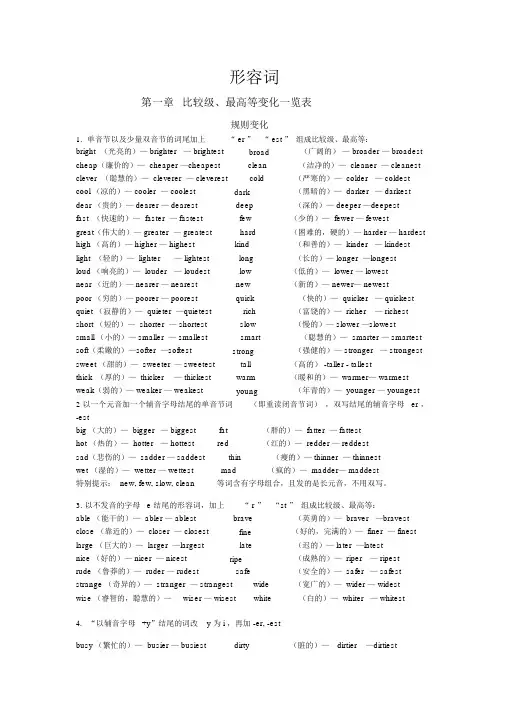
形容词第一章比较级、最高等变化一览表规则变化1. 单音节以及少量双音节的词尾加上“ er ” “ est ”组成比较级、最高等:bright (光亮的)— brighter — brightest broad(广阔的)— broader — broadest cheap(廉价的)— cheaper —cheapest clean(洁净的)— cleaner — cleanest clever (聪慧的)— cleverer — cleverest cold(严寒的)— colder— coldestcool (凉的)— cooler — coolest dark(黑暗的)— darker— darkest dear (贵的)— dearer — dearest deep(深的)— deeper —deepestfast (快速的)— faster — fastest few(少的)— fewer — fewestgreat(伟大的)— greater — greatest hard(困难的,硬的)— harder — hardest high (高的)— higher — highest kind(和善的)— kinder— kindestlight (轻的)— lighter— lightest long(长的)— longer —longestloud (响亮的)— louder— loudest low(低的)— lower — lowestnear (近的)— nearer — nearest new(新的)— newer— newestpoor (穷的)— poorer — poorest quick(快的)— quicker— quickest quiet (寂静的)— quieter —quietest rich(富饶的)— richer— richest short (短的)— shorter — shortest slow(慢的)— slower —slowestsmall (小的)— smaller — smallest smart(聪慧的)— smarter — smartest soft(柔嫩的)—softer —softest strong(强健的)— stronger— strongest sweet (甜的)— sweeter— sweetest tall(高的) -taller - tallestthick (厚的)— thicker— thickest warm(暖和的)— warmer— warmest weak(弱的)— weaker — weakest young(年青的)— younger — youngest2 以一个元音加一个辅音字母结尾的单音节词(即重读闭音节词),双写结尾的辅音字母 er ,-estbig (大的)— bigger— biggest fat(胖的)— fatter — fattesthot (热的)— hotter— hottest red(红的)— redder — reddestsad(悲伤的)— sadder — saddest thin(瘦的)— thinner — thinnestwet (湿的)— wetter — wettest mad(疯的)— madder— maddest特别提示: new, few, slow, clean等词含有字母组合,且发的是长元音,不用双写。
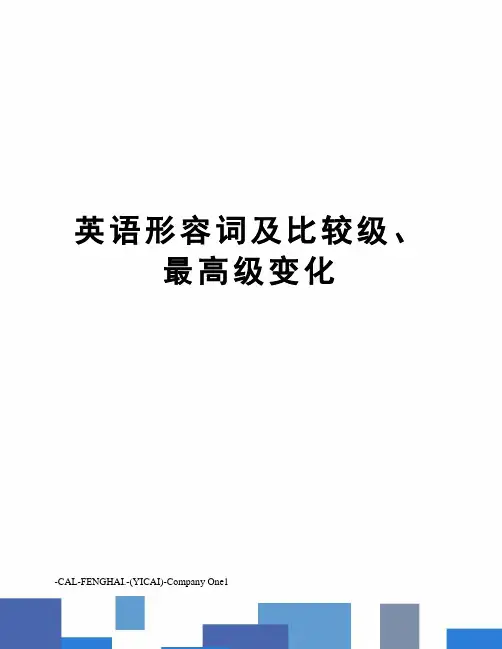
英语形容词及比较级、最高级变化-CAL-FENGHAI.-(YICAI)-Company One1形容词第一章比较级、最高级变化一览表规则变化1.单音节以及少数双音节的词尾加上“er”“est”构成比较级、最高级:bright(明亮的)—brighter—brightest broad(广阔的)—broader—broadestcheap(便宜的)—cheaper—cheapest clean(干净的)—cleaner—cleanest clever(聪明的)—cleverer—cleverest cold(寒冷的)—colder—coldest cool(凉的)—cooler—coolest dark(黑暗的)—darker—darkestdear(贵的)—dearer—dearest deep(深的)—deeper—deepestfast(迅速的)—faster—fastest few(少的)—fewer—fewestgreat(伟大的)—greater—greatest hard(困难的,硬的)—harder—hardesthigh(高的)—higher—highest kind(善良的)—kinder—kindestlight(轻的)—lighter—lightest long(长的)—longer—longestloud(响亮的)—louder—loudest low(低的)—lower—lowestnear(近的)—nearer—nearest new(新的)—newer—newestpoor(穷的)—poorer—poorest quick(快的)—quicker—quickestquiet(安静的)—quieter—quietest rich(富裕的)—richer—richestshort(短的)—shorter—shortest slow(慢的)—slower—slowestsmall(小的)—smaller—smallest smart(聪明的)—smarter—smartestsoft(柔软的)—softer—softest strong(强壮的)—stronger—strongestsweet(甜的)—sweeter—sweetest tall(高的)-taller - tallestthick(厚的)—thicker—thickest warm(温暖的)—warmer—warmestweak(弱的)—weaker—weakest young(年轻的)—younger —youngest2以一个元音加一个辅音字母结尾的单音节词(即重读闭音节词),双写结尾的辅音字母er,-estbig(大的)—bigger—biggest fat(胖的)—fatter—fattesthot(热的)—hotter—hottest red(红的)—redder—reddest sad(伤心的)—sadder—saddest thin(瘦的)—thinner—thinnestwet(湿的)—wetter—wettest mad(疯的)—madder—maddest特别提醒:new, few, slow, clean等词含有字母组合,且发的是长元音,不用双写。
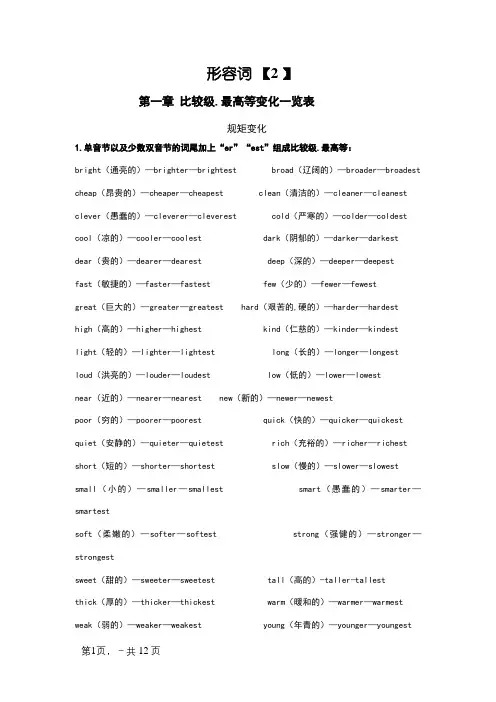
形容词【2 】第一章比较级.最高等变化一览表规矩变化1.单音节以及少数双音节的词尾加上“er”“est”组成比较级.最高等:bright(通亮的)—brighter—brightest broad(辽阔的)—broader—broadestcheap(昂贵的)—cheaper—cheapest clean(清洁的)—cleaner—cleanest clever(愚蠢的)—cleverer—cleverest cold(严寒的)—colder—coldest cool(凉的)—cooler—coolest dark(阴郁的)—darker—darkestdear(贵的)—dearer—dearest deep(深的)—deeper—deepestfast(敏捷的)—faster—fastest few(少的)—fewer—fewestgreat(巨大的)—greater—greatest hard(艰苦的,硬的)—harder—hardesthigh(高的)—higher—highest kind(仁慈的)—kinder—kindestlight(轻的)—lighter—lightest long(长的)—longer—longestloud(洪亮的)—louder—loudest low(低的)—lower—lowestnear(近的)—nearer—nearest new(新的)—newer—newestpoor(穷的)—poorer—poorest quick(快的)—quicker—quickestquiet(安静的)—quieter—quietest rich(充裕的)—richer—richestshort(短的)—shorter—shortest slow(慢的)—slower—slowestsmall(小的)—smaller—smallest smart(愚蠢的)—smarter—smartestsoft(柔嫩的)—softer—softest strong(强健的)—stronger—strongestsweet(甜的)—sweeter—sweetest tall(高的)-taller-tallest thick(厚的)—thicker—thickest warm(暖和的)—warmer—warmestweak(弱的)—weaker—weakest young(年青的)—younger—youngest2以一个元音加一个子音字母结尾的单音节词(即重读闭音节词),双写结尾的子音字母er,-estbig(大的)—bigger—biggest fat(胖的)—fatter—fattesthot(热的)—hotter—hottest red(红的)—redder—reddestsad(悲伤的)—sadder—saddest thin(瘦的)—thinner—thinnestwet(湿的)—wetter—wettest mad(疯的)—madder—maddest特殊提示:new, few, slow, clean等词含有字母组合,且发的是长元音,不用双写.3.以不发音的字母e结尾的形容词,加上“r”“st”组成比较级.最高等:able(能干的)—abler—ablest brave(大胆的)—braver—bravestclose(接近的)—closer—closest fine(好的,完善的)—finer—finestlarge(巨大的)—larger—largest late(迟的)—later—latest nice(好的)—nicer—nicest ripe(成熟的)—riper—ripestrude(粗鲁的)—ruder—rudest safe(安全的)—safer—safest strange(奇异的)—stranger—strangest wide(宽广的)—wider—widestwise(睿智的,愚蠢的)—wiser—wisest white(白的)—whiter—whitest4.“以子音字母+y”结尾的词改y为i,再加-er, -estbusy(劳碌的)—busier—busiest dirty(脏的)—dirtier—dirtiest dry(湿润的)—drier—driest early(早的)—earlier—earliesteasy(轻易的)—easier—easiest friendly(友爱的)—friendlier—friendliestfunny(好玩的)—funnier—funniest happy(高兴的)—happier—happiest healthy(健康的)—healthier—healthiest heavy(重的)—heavier—heaviest hungry(饿的)—hungrier—hungriest lazy(懒散的)—lazier—laziestlucky(荣幸的)—luckier—luckiest naughty(油滑的)—naughtier—naughtiestnoisy(嘈杂的)—noisier—noisiest pretty(俏丽的)—prettier—prettiestsilly(傻的)—sillier—silliest spicy(辣的)—spicier—spiciestthirsty(渴的)—thirstier—thirstiest ugly(丑的)—uglier—ugliest 5.双音节.多音节形容词(即音标中含有三个或三个以上元音音素的词),在单词前面加上“more”“most”组成比较级.最高等:afraid(畏惧的)—more afraid—most afraidbeautiful(俏丽的)—more beautiful—most beautifulcareful(细心的)—more careful—most carefulcheerful(高兴的)—more cheerful—most cheerfulcrowded(拥挤的)—more crowded—most crowdeddangerous(安全的)—more dangerous—most dangerousdelicious(厚味的)—more delicious—most deliciousdifficult(艰苦的)—more difficult—most difficultexciting(令人高兴的)—more exciting—most excitingexpensive(昂贵的)—more expensive—most expensivefamous(有名的)—more famous—most famousfrightened(吃惊的)—more frightened—most frightenedfrightening(令人畏惧的)—more frightening—most frighteninghard-working(勤恳的)—more hard-working—most hard-workinghelpful(有关心的)—more helpful—most helpfulhonest(说谎的)—more honest—most honestimportant(主要的)—more important—most importantinteresting(有味的)—more interesting—most interestingpolite(有礼貌的)—more polite—most politeterrible(恐怖的)—more terrible—most terribletired(累的)—more tired—most tired特殊提示:以形容前缀un组成的三音节形容词不合适上述情形,如:unhappy-unhappier-unhappiest, untidy-untidier-untidiest6. 以形容词+ly组成的副词要在前面加 more,mostSlowly-more slowly-most slowly quickly-more quickly-most quickly特殊提示:early -earlier-earliest7. 由ing分词和-ed分词演化过来的形容词(包括不规矩动词如know→known)只能加more 或most来表示它们的比较级和最高等.interesting- more interesting -most interestingexcited- more excited- most excitingtired- more tired - most tiredboring-more boring-most boring不规矩变化bad(坏的)—worse—worstfar(远的)—farther—farthest (far—further—furthest)good(好的)—better—bestill(病的)—worse—worstlittle(少的)—less—leastmany(多的)—more—mostmuch(多的)—more—mostold(年迈的)—older—oldest ( old—elder—eldest)well(好的,身材好的)—better—best特殊提示:◇further不仅可以指“距离更远”,还可指“程度更深”.记住以下三个词组:further study(进修)further education(持续教导) further information (进一步的信息)◇elder仅用于平辈之间的排行,如: elder sister(姐姐) elder brother (哥哥)◇less作为“更少”仅用来润饰不可数名词,润饰可数名词表示“更少”要用fewer.第二章形容词副词比较级较难考点◇少数单音节词前面加 more, most 组成比较级和最高等,这类形容词一般为表语形容词和由曩昔分词变成的形容词afraid -more afraid, most afraid tired - more tired , most tiredfond - more fond , most fond glad -more glad , most gladbored - more bored , most bored pleased---- more pleased , most pleased ◇下列形容词和副词的比较级和最高等有两种情势,即:既可加-er/-est也可加more/moststrict, often, friendly, clever◇下列形容词和副词没有比较级和最高(即表示“最高程度”或“绝对状况”的形容词和副词没有比较级和最高等)如:empty, wrong, perfect, unique, extreme, excellent, favourite, true, right, correct, extremely ...◇比较应在同类事物之间进行.误:Your English is better than me.正:Your English is better than mine.◇比较级前可以有一个表示程度的状语,最常见的三大润饰词是:a little, much, even. 以下单词也可用来润饰:any, far, still, a lot, yet, rather.My sister is a little taller than me.Their house is much larger than ours.别的,名词短语也可润饰比较级,解释程度.I’m three years older than he.特殊提示:very, quite, too不可润饰比较级.◇避免反复应用比较级.误:He is more kinder to small animals than I.正:He is much kinder to small animals than I.误:He is more cleverer than his brother.正:He is cleverer than his brother.◇比较要相符逻辑,在统一规模内比较时,避免将主语含在比较对象中,这时需应用other 来消除自身.误:China is larger that any country in Asia.正:China is larger than any other country in Asia.误:John studies harder than any student in his class.正:John studies harder than any other student in his class.正:John studies harder than any of the other students in his class.正:John studies harder than anyone else in his class.◇比较要遵守前后一致的原则,留意前后呼应.The population of Shanghai is larger than that of Beijing.It is easier to make a plan than to carry it out.◇序数词平日只润饰最高等.Africa is the second largest continent.The Yellow River is the second longest river in China.This is the third most popular song of Michael Jackson.◇为避免反复,我们平日用that, those, one, ones代替前面消失的名词.that代替可数名词单数和不可数名词,those代替可数名词复数.one既可指人又可指物,只能代替可数名词.The weather in China is different from that in America.The book on the table is more interesting than that(或the one)on the desk.A box made of steel is stronger than one made of wood.误:In winter, the weather of Beijing is colder than it of Shanghai.正:In winter, the weather of Beijing is colder than that of Shanghai.◇“否认词 + 比较级”相当于最高等.----Wait until we get a satisfactory reply, will you?----I couldn't agree more. The idea sounds great to me.Nothing is so easy as this. =Nothing is easier than this. =This is the easiest thing.◇比较级前一般不加冠词.但表示两者中较凸起者,且比较级后又有名词或消失了of the two,这时比较级前必定要加the.He is the taller of the two.Of the two jobs,he chose the harder.Which is the younger one, Lily or Lucy?试比较:Which is larger, Canada or Australia?Which is the larger country, Canada or Australia?She is taller than her two sisters.She is the taller of the two sisters.◇不含than 的比较级前可加不定冠词润饰,组成“a/an+比较级+单数可数名词”表示“一个更……的人/物”.Why don’t you use a sharper knife? 你为什么不用一把更锐利的刀呢?◇比较级than 后应用人称代词的主格,但非正式语体中常用宾格.He is taller than I/me.◇为避免反复,比较级中同样的动词用助动词do, does, did替代.I spend less time doing homework than John does.She tells more funny jokes than we do.以下内容不是初中教授教养的重点,仅供拓展之用.◇形容词most前面没有the,不表示最高等的寄义,只表示“异常”.It is a most important problem.=It is a very important problem.◇倍数表达法▲A is three(four, etc.)times the size(height, length etc.)of B.The new building is four times the size(the height)of the old one.这座新楼是那座旧楼的四倍大(高)/这座新楼比那座旧楼大(高)三倍.▲A is three(four, etc.)times as big(high, long, etc.)as B.Asia is four times as large as Europe. 亚洲是欧洲的四倍大/亚洲比欧洲大三倍. ▲A is three (four, etc.)times bigger(higher, longer, etc.)than B.Your school is three times bigger than ours.你们的黉舍比我们的黉舍大三倍.用times表倍数平日用于三倍以上,两倍可以用twice或double.第三章形容词副词比较级最高等重点句型归纳◇句型一:形容词或副词比较级+than…□留意事项:该句型为比较级的最根本句型.只要看到than,即可肯定前面应用比较级.He is taller than I am.The boy does his homework more carefully than the girl.◇句型二:less + 形容词的原级 + than□留意事项:该句型表示“不如.不及”,特殊须要留意的是,less本身就是little的比较级,后面必须跟形容词的原级,否认就造成了比较级的反复应用.This computer is less expensive than that one.◇句型三:as +形容词或副词的原级+ as□留意事项:该句型表示比较的两者程度相当,as之间必须跟形容词或副词的原级,决不能应用比较级.此外,还要肯定应用形容词照样副词.肯定的根据就是根据第一个as前的动词,假如是系动词(如be,感官动词look, sound, smell, taste, feel等),那么就用形容词的原级,假如前面的动词是一般的实义动词,那么就必须用副词的原级润饰动词.This lesson is as easy as that one.Lucy talks with old people as politely as her sister.特殊提示:as…as之间也可以跟名词,句型如下:☆as +形容词+ a/an +单数名词+asHe is as kind a person as his father. 他和他爸爸一样都是仁慈的人.☆as + many/much+不可数名词/可数名词复数+asI can carry as much paper as you can. 你能搬若干纸,我也能.I have as many books as you do. 我的书和你的一样多.We’ll give you as much help as we can. 我们将尽我们所能给你关心.其它几个关于as…as的句型:☆as … as one can:尽其所能He began to run as fast as he could.☆as … as possible:尽可能Please help us as quickly as possible.☆as soon as…一……就……He will call me as soon as he comes here.◇句型四:not as/so +形容词或副词的原级+ as□留意事项:该句型表示“前者不如后者……”,往往可以与句型一和句型二调换.第一个as可以换为so.This classroom is not as bright as yours.I cannot run as fast as you.◇句型五:the +形容词或副词最高等+ in / of / among +比较规模□留意事项:假如这里为副词最高等,前面的the常常省略.介词in和of的用法完整不一样.in表示“在某一规模内”,如:in the classroom,in the world.of表示“在同类之间”,of后面的词与主语同类,另名词前一般有冠词the.among表示“在(三者或三者以上)之间”,among后接代词或没有润饰语的名词.The Changjiang River is the longest river in our country.Peter is the tallest of the six students.This picture is the most beautiful among these.◇句型六:one of + 形容词最高等+可数名词复数情势□留意事项:one of有三大考点:1. 后跟形容词最高等;2. 后接可数名词复数情势;3. 作主语时主语为one,谓语动词用单数情势.One of the smallest dinosaurs was about one metre long.◇句型七:比较级+and +比较级 / more and more +多音节词的原级□留意事项:该句型表示“越来越……”,假如该形容词比较级组成情势加er,则用前面的句型;假如该形容词比较级加more组成,则用后面的句型.It is getting hotter and hotter.The girl is becoming more and more beautiful.◇句型八:the +比较级+…, the +比较级+…□留意事项:该句型意思为“越……就越……”,表示两种情形同时变化.The more you eat, the fatter you will be.In the test, the more careful you are, the fewer mistakes you will make.◇句型九:be different from□留意事项:该句型没有应用比较级,但也是对两者事物进行比较.留意前后比较需在同类事物中进行. My schoolbag is different from yours.◇句型十:the same as… / the same…as…□留意事项:该句型同样没有应用比较级,表示两者之间具有配合特征.留意这里的as和same为固定搭配,不能随意变换.I don’t want to buy the same things as Amy did.◇句型十一:比较级+than + any other +名词单数情势□留意事项:any other 后面跟单数名词,表示“任何别的”,即主语在规模内,必须把自身从这一规模内除去,不然逻辑上不通.假如主语不在这一规模内,那么要把other去失落,只用any即可. Shanghai is larger than any other city in China.(上海在中国这个规模内,所以用any other)Shanghai is larger than any city in Jiangsu. (上海不在江苏,所以只需用any)◇句型十二:比较级+than + the other +名词复数情势□留意事项:该句型相当于any other +名词单数情势,常用来进行同义句改写.该句型与句型十一固然波表面上都是比较级,但现实上相当于最高等.以下三句表达的是统一个意思.Daniel is the most hard-working student in our class.Daniel is more hard-working than any other student in our class.Daniel is more hard-working than the other students in our class.特殊提示:表示两者(人或物)比较时,比较的对象应是同类事物,不同类的事物之间无法进行比较.。
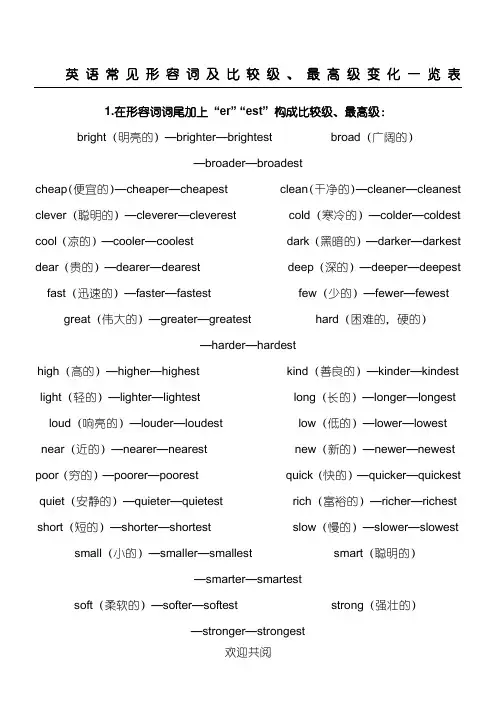
英语常见形容词及比较级、最高级变化一览表1.在形容词词尾加上“er” “est” 构成比较级、最高级:bright(明亮的)—brighter—brightest broad(广阔的)—broader—broadestcheap(便宜的)—cheaper—cheapest clean(干净的)—cleaner—cleanest clever(聪明的)—cleverer—cleverest cold(寒冷的)—colder—coldest cool(凉的)—cooler—coolest dark(黑暗的)—darker—darkest dear(贵的)—dearer—dearest deep(深的)—deeper—deepest fast(迅速的)—faster—fastest few(少的)—fewer—fewest great(伟大的)—greater—greatest hard(困难的,硬的)—harder—hardesthigh(高的)—higher—highest kind(善良的)—kinder—kindest light(轻的)—lighter—lightest long(长的)—longer—longest loud(响亮的)—louder—loudest low(低的)—lower—lowest near(近的)—nearer—nearest new(新的)—newer—newest poor(穷的)—poorer—poorest quick(快的)—quicker—quickest quiet(安静的)—quieter—quietest rich(富裕的)—richer—richest short(短的)—shorter—shortest slow(慢的)—slower—slowest small(小的)—smaller—smallest smart(聪明的)—smarter—smartestsoft(柔软的)—softer—softest strong(强壮的)—stronger—strongestsweet(甜的)—sweeter—sweetest tall(高的)-taller-tallest thick(厚的)—thicker—thickest warm(温暖的)—warmer—warmest weak(弱的)—weaker—weakest young(年轻的)—younger—youngest2.双写最后一个字母,再加上“er” “est” 构成比较级、最高级:big(大的)—bigger—biggest fat(胖的)—fatter—fattesthot(热的)—hotter—hottest red(红的)—redder—reddest sad(伤心的)—sadder—saddest thin(瘦的)—thinner—thinnest wet(湿的)—wetter—wettest mad(疯的)—madder—maddest3.以不发音的字母e结尾的形容词,加上“r” “st” 构成比较级、最高级:able(能干的)—abler—ablest brave(勇敢的)—braver—bravest close(接近的)—closer—closest fine(好的,完美的)—finer—finest large(巨大的)—larger—largest late(迟的)—later—latest nice(好的)—nicer—nicest ripe(成熟的)—riper—ripest rude(粗鲁的)—ruder—rudest safe(安全的)—safer—safest strange(奇怪的)—stranger—strangest wide(宽广的)—wider—widest wise(睿智的,聪明的)—wiser—wisest white(白的)—whiter—whitest4.以字母y结尾的形容词,把y改为i,再加上“er” “est” 构成比较级、最高级:busy(忙碌的)—busier—busiest dirty(脏的)—dirtier—dirtiest dry(干燥的)—drier—driest early(早的)—earlier—earliest easy(容易的)—easier—easiest friendly(友好的)—friendlier—friendliestfunny(好玩的)—funnier—funniest happy(开心的)—happier—happiesthealthy(健康的)—healthier—healthiest heavy(重的)—heavier—heaviest hungry(饿的)—hungrier—hungriest lazy(懒惰的)—lazier—laziest lucky(幸运的)—luckier—luckiest naughty(调皮的)—naughtier—naughtiestnoisy(嘈杂的)—noisier—noisiest pretty(美丽的)—prettier—prettiest silly(傻的)—sillier—silliest spicy(辣的)—spicier—spiciest thirsty(渴的)—thirstier—thirstiest ugly(丑的)—uglier—ugliest 5.双音节、多音节形容词,在单词前面加上“more” “most” 构成比较级、最高级:afraid(害怕的)—more afraid—most afraidbeautiful(美丽的)—more beautiful—most beautifulcareful(仔细的)—more careful—most carefulcheerful(开心的)—more cheerful—most cheerfulcrowded(拥挤的)—more crowded—most crowdeddangerous(危险的)—more dangerous—most dangerousdelicious(美味的)—more delicious—most deliciousdifficult(困难的)—more difficult—most difficultexciting(令人兴奋的)—more exciting—most excitingexpensive(昂贵的)—more expensive—most expensivefamous(著名的)—more famous—most famousfrightened(受惊的)—more frightened—most frightenedfrightening(令人害怕的)—more frightening—most frighteninghard-working(勤奋的)—more hard-working—most hard-workinghelpful(有帮助的)—more helpful—most helpfulhonest(诚实的)—more honest—most honestimportant(重要的)—more important—most importantinteresting(有趣的)—more interesting—most interestingpolite(有礼貌的)—more polite—most politeterrible(可怕的)—more terrible—most terribletired(累的)—more tired—most tired6.不规则变化的形容词:bad(坏的)—worse—worstfar(远的)—farther—farthest (far—further—furthest)good(好的)—better—bestill(病的)—worse—worstlittle(少的)—less—leastmany(多的)—more—mostmuch(多的)—more—mostold(年老的)—older—oldest ( old—elder—eldest)well(好的,身体好的)—better—best形容词的比较级和最高级: 形容词的比较级和最高级形式是在形容词的原级形式的基础上变化的。
形容词第一章比较级、最高级变化一览表规则变化1.单音节以及少数双音节的词尾加上“er”“est”构成比较级、最高级:bright(明亮的)—brighter—brightest broad(广阔的)—broader—broadestcheap(便宜的)—cheaper—cheapest clean(干净的)—cleaner—cleanest clever(聪明的)—cleverer—cleverest cold(寒冷的)—colder—coldestcool(凉的)—cooler—coolest dark(黑暗的)—darker—darkestdear(贵的)—dearer—dearest deep(深的)—deeper—deepestfast(迅速的)—faster—fastest few(少的)—fewer—fewestgreat(伟大的)—greater—greatest hard(困难的,硬的)—harder—hardesthigh(高的)—higher—highest kind(善良的)—kinder—kindestlight(轻的)—lighter—lightest long(长的)—longer—longestloud(响亮的)—louder—loudest low(低的)—lower—lowestnear(近的)—nearer—nearest new(新的)—newer—newestpoor(穷的)—poorer—poorest quick(快的)—quicker—quickestquiet(安静的)—quieter—quietest rich(富裕的)—richer—richestshort(短的)—shorter—shortest slow(慢的)—slower—slowestsmall(小的)—smaller—smallest smart(聪明的)—smarter—smartestsoft(柔软的)—softer—softest strong(强壮的)—stronger—strongestsweet(甜的)—sweeter—sweetest tall(高的)-taller - tallest thick(厚的)—thicker—thickest warm(温暖的)—warmer—warmestweak(弱的)—weaker—weakest young(年轻的)—younger—youngest2以一个元音加一个辅音字母结尾的单音节词(即重读闭音节词),双写结尾的辅音字母er,-estbig(大的)—bigger—biggest fat(胖的)—fatter—fattesthot(热的)—hotter—hottest red(红的)—redder—reddestsad(伤心的)—sadder—saddest thin(瘦的)—thinner—thinnestwet(湿的)—wetter—wettest mad(疯的)—madder—maddest特别提醒:new, few, slow, clean等词含有字母组合,且发的是长元音,不用双写。
形容词之五兆芳芳创作第一章比较级、最初级变更一览表法则变更1.单音节以及少数双音节的词尾加上“er”“est”组成比较级、最初级:bright(明亮的)—brighter—brightest broad(广漠的)—broader—broadestcheap(廉价的)—cheaper—cheapest clean(洁净的)—cleaner—cleanestclever(聪明的)—cleverer—cleverest cold(冰冷的)—colder—coldestcool(凉的)—cooler—coolest dark(暗中的)—darker—darkestdear(贵的)—dearer—dearest deep(深的)—deeper—deepestfast(迅速的)—faster—fastest few(少的)—fewer—fewestgreat(伟大的)—greater—greatest hard(困难的,硬的)—harder—hardesthigh(高的)—higher—highest kind(善良的)—kinder—kindestlight(轻的)—lighter—lightest long(长的)—longer—longestloud(响亮的)—louder—loudest low(低的)—lower—lowestnear(近的)—nearer—nearest new(新的)—newer—newest poor(穷的)—poorer—poorest quick(快的)—quicker—quickestquiet(宁静的)—quieter—quietest rich(充裕的)—richer—richestshort(短的)—shorter—shortest slow(慢的)—slower—slowestsmall(小的)—smaller—smallest smart(聪明的)—smarter—smartestsoft(柔软的)—softer—softest strong(强壮的)—stronger—strongestsweet(甜的)—sweeter—sweetest tall(高的)-taller-tallestthick(厚的)—thicker—thickest warm(温暖的)—warmer—warmestweak(弱的)—weaker—weakest young(年轻的)—younger—youngest2以一个元音加一个子音字母结尾的单音节词(即重读闭音节词),双写结尾的子音字母er,-estbig(大的)—bigger—biggest fat(胖的)—fatter—fattesthot(热的)—hotter—hottest red(红的)—redder—reddestsad(伤心的)—sadder—saddest thin(瘦的)—thinner—thinnestwet(湿的)—wetter—wettest mad(疯的)—madder—maddest特别提醒:new, few, slow, clean等词含有字母组合,且发的是长元音,不必双写.3.以不发音的字母e结尾的形容词,加上“r”“st”组成比较级、最初级:able(能干的)—abler—ablest brave(勇敢的)—braver—bravestclose(接近的)—closer—closest fine(好的,完美的)—finer—finestlarge(巨大的)—larger—largest late(迟的)—later—latestnice(好的)—nicer—nicest ripe(成熟的)—riper—ripestrude(粗鲁的)—ruder—rudest safe(平安的)—safer—safeststrange(奇怪的)—stranger—strangest wide(宽广的)—wider—widestwise(睿智的,聪明的)—wiser—wisest white(白的)—whiter—whitest4.“以子音字母+y”结尾的词改y为i,再加-er, -estbusy(忙碌的)—busier—busiest dirty(脏的)—dirtier—dirtiestdry(枯燥的)—drier—driest early(早的)—earlier—earliesteasy(容易的)—easier—easiest friendly(友好的)—friendlier—friendliestfunny(好玩的)—funnier—funniest happy(开心的)—happier—happiesthealthy(安康的)—healthier—healthiest heavy(重的)—heavier—heaviesthungry(饿的)—hungrier—hungriest lazy(懒惰的)—lazier—laziestlucky(幸运的)—luckier—luckiest naughty(调皮的)—naughtier—naughtiestnoisy(喧闹的)—noisier—noisiest pretty(美丽的)—prettier—prettiestsilly(傻的)—sillier—silliest spicy(辣的)—spicier—spiciestthirsty(渴的)—thirstier—thirstiest ugly(丑的)—uglier—ugliest5.双音节、多音节形容词(即音标中含有三个或三个以上元音音素的词),在单词前面加上“more”“most”组成比较级、最初级:afraid(惧怕的)—more afraid—most afraidbeautiful(美丽的)—more beautiful—most beautifulcareful(仔细的)—more careful—most carefulcheerful(开心的)—more cheerful—most cheerfulcrowded(拥挤的)—more crowded—most crowded dangerous(危险的)—more dangerous—most dangerous delicious(美味的)—more delicious—most delicious difficult(困难的)—more difficult—most difficultexciting(令人兴奋的)—more exciting—most exciting expensive(昂贵的)—more expensive—most expensive famous(著名的)—more famous—most famousfrightened(受惊的)—more frightened—most frightened frightening(令人惧怕的)—more frightening—most frightening hard-working(勤奋的)—more hard-working—most hard-workinghelpful(有帮忙的)—more helpful—most helpfulhonest(诚实的)—more honest—most honestimportant(重要的)—more important—most important interesting(有趣的)—more interesting—most interesting polite(有礼貌的)—more polite—most politeterrible(可怕的)—more terrible—most terribletired(累的)—more tired—most tired特别提醒:以形容前缀un组成的三音节形容词不适合上述情况,如:unhappy-unhappier-unhappiest, untidy-untidier-untidiest 6. 以形容词+ly组成的副词要在前面加more,mostSlowly-more slowly-most slowly quickly-more quickly-most quickly特别提醒:early -earlier-earliest7. 由ing分词和-ed分词演变过来的形容词(包含不法则动词如know→known)只能加more或most来暗示它们的比较级和最初级.interesting- more interesting -most interestingexcited- more excited - most excitingtired- more tired - most tiredboring-more boring -most boring不法则变更bad(坏的)—worse—worstfar(远的)—farther—farthest (far—further—furthest)good(好的)—better—bestill(病的)—worse—worstlittle(少的)—less—leastmany(多的)—more—mostmuch(多的)—more—mostold(年老的)—older—oldest ( old—elder—eldest)well(好的,身体好的)—better—best特别提醒:◇further不但可以指“距离更远”,还可指“程度更深”.记住以下三个词组:further study(进修)further education(持续教育) further information (进一步的信息)◇elder仅用于同辈之间的排行,如: elder sister(姐姐) elder brother (哥哥)◇less作为“更少”仅用来修饰不成数名词,修饰可数名词暗示“更少”要用fewer.第二章形容词副词比较级较难考点◇少数单音节词前面加more, most 组成比较级和最初级,这类形容词一般为表语形容词和由过来分词酿成的形容词afraid -more afraid, most afraid tired - more tired , mosttiredfond - more fond , most fond glad -more glad , most gladbored - more bored , most bored pleased---- more pleased , most pleased◇下列形容词和副词的比较级和最初级有两种形式,即:既可加-er/-est也可加more/moststrict, often, friendly, clever◇下列形容词和副词没有比较级和最高(即暗示“最高程度”或“绝对状态”的形容词和副词没有比较级和最初级)如:empty, wrong, perfect, unique, extreme, excellent, favourite, true, right, correct, extremely ...◇比较应在同类事物之间进行.误:Your English is better than me.正:Your English is better than mine.◇比较级前可以有一个暗示程度的状语,最罕有的三大修饰词是:a little, much, even.以下单词也可用来修饰:any, far, still, a lot, yet, rather.My sister is a little taller than me.Their house is much larger than ours.另外,名词短语也可修饰比较级,说明程度.I’m three years older than he.特别提醒:very, quite, too不成修饰比较级.◇避免重复使用比较级.误:He is more kinder to small animals than I.正:He is much kinder to small animals than I.误:He is more cleverer than his brother.正:He is cleverer than his brother.◇比较要合适逻辑,在同一规模内比较时,避免将主语含在比较对象中,这时需使用other来排除自身.误:China is larger that any country in Asia.正:China is larger than any other country in Asia.误:John studies harder than any student in his class.正:John studies harder than any other student in his class.正:John studies harder than any of the other students in his class.正:John studies harder than anyone else in his class.◇比较要遵循前后一致的原则,注意前后照应.The population of Shanghai is larger than that of Beijing.It is easier to make a plan than to carry it out.◇序数词通常只修饰最初级.Africa is the second largest continent.The Yellow River is the second longest river in China.This is the third most popular song of Michael Jackson.◇为避免重复,我们通经常使用that, those, one, ones代替前面出现的名词.that代替可数名词单数和不成数名词,those代替可数名词单数.one既可指人又可指物,只能代替可数名词. The weather in China is different from that in America.The book on the table is more interesting than that(或the one)on the desk.A box made of steel is stronger than one made of wood.误:In winter, the weather of Beijing is colder than it of Shanghai.正:In winter, the weather of Beijing is colder than that of Shanghai.◇“否认词+ 比较级”相当于最初级.----Wait until we get a satisfactory reply, will you?----I couldn't agree more. The idea sounds great to me.Nothing is so easy as this. =Nothing is easier than this. =This is the easiest thing.◇比较级前一般不加冠词.但暗示两者中较突出者,且比较级后又有名词或出现了of the two,这时比较级前一定要加the.He is the taller of the two.Of the two jobs,he chose the harder.Which is the younger one, Lily or Lucy?试比较:Which is larger, Canada or Australia?Which is the larger country, Canada or Australia?She is taller than her two sisters.She is the taller of the two sisters.◇不含than 的比较级前可加不定冠词修饰,组成“a/an+比较级+单数可数名词”暗示“一个更……的人/物”.Why don’t you use a sharper knife? 你为什么不必一把更尖利的刀呢?◇比较级than 后应用人称代词的主格,但非正式语体中经常使用宾格.He is taller than I/me.◇为避免重复,比较级中同样的动词用助动词do, does, did 替代.I spend less time doing homework than John does.She tells more funny jokes than we do.以下内容不是初中教学的重点,仅供拓展之用.◇形容词most前面没有the,不暗示最初级的寄义,只暗示“很是”.It is a most important problem.=It is a very important problem.◇倍数表达法▲A is three(four, etc.)times the size(height, length etc.)of B.The new building is four times the size(the height)of the old one.这座新楼是那座旧楼的四倍大(高)/这座新楼比那座旧楼大(高)三倍.▲A is three(four, etc.)times as big(high, long, etc.)as B.Asia is four times as large as Europe. 亚洲是欧洲的四倍大/亚洲比欧洲大三倍.▲A is three (four, etc.)times bigger(higher, longer, etc.)than B. Your school is three times bigger than ours.你们的学校比我们的学校大三倍.用times表倍数通经常使用于三倍以上,两倍可以用twice或double.第三章形容词副词比较级最初级重点句型归结◇句型一:形容词或副词比较级+than…□注意事项:该句型为比较级的最根本句型.只要看到than,便可确定前面使用比较级.He is taller than I am.The boy does his homework more carefully than the girl.◇句型二:less + 形容词的原级+ than□注意事项:该句型暗示“不如、不及”,特别需要注意的是,less自己就是little的比较级,前面必须跟形容词的原级,否认就造成了比较级的重复使用.This computer is less expensive than that one.◇句型三:as +形容词或副词的原级+ as□注意事项:该句型暗示对比的两者程度相当,as之间必须跟形容词或副词的原级,决不克不及使用比较级.此外,还要确定使用形容词仍是副词.确定的依据就是按照第一个as前的动词,如果是系动词(如be,感官动词look, sound, smell, taste, feel等),那么就用形容词的原级,如果前面的动词是一般的实义动词,那么就必须用副词的原级修饰动词.This lesson is as easy as that one.Lucy talks with old people as politely as her sister.特别提醒:as…as之间也可以跟名词,句型如下:☆as +形容词+ a/an +单数名词+asHe is as kind a person as his father. 他和他爸爸一样都是善良的人.☆as + many/much+不成数名词/可数名词单数+asI can carry as much paper as you can. 你能搬多少纸,我也能.I have as many books as you do. 我的书和你的一样多.We’ll give you as much help as we can. 我们将尽我们所能给你帮忙.其它几个关于as…as的句型:☆as … as one can:尽其所能He began to run as fast as he could.☆as … as possible:尽可能Please help us as quickly as possible.☆as soon as…一……就……He will call me as soon as he comes here.◇句型四:not as/so +形容词或副词的原级+ as□注意事项:该句型暗示“前者不如后者……”,往往可以与句型一和句型二替换.第一个as可以换为so.This classroom is not as bright as yours.I cannot run as fast as you.◇句型五:the +形容词或副词最初级+ in / of / among +比较规模□注意事项:如果这里为副词最初级,前面的the经常省略.介词in和of 的用法完全不一样.in暗示“在某一规模内”,如:in the classroom,in the world.of暗示“在同类之间”,of前面的词与主语同类,另名词前一般有冠词the.among暗示“在(三者或三者以上)之间”,among后接代词或没有修饰语的名词. The Changjiang River is the longest river in our country.Peter is the tallest of the six students.This picture is the most beautiful among these.◇句型六:one of + 形容词最初级+可数名词单数形式□注意事项:one of有三大考点:1. 后跟形容词最初级;2. 后接可数名词单数形式;3. 作主语时主语为one,谓语动词用单数形式. One of the smallest dinosaurs was about one metre long.◇句型七:比较级+and +比较级/ more and more +多音节词的原级□注意事项:该句型暗示“越来越……”,如果该形容词比较级组成形式加er,则用前面的句型;如果该形容词比较级加more组成,则用前面的句型.It is getting hotter and hotter.The girl is becoming more and more beautiful.◇句型八:the +比较级+…, the +比较级+…□注意事项:该句型意思为“越……就越……”,暗示两种情况同时变更. The more you eat, the fatter you will be.In the test, the more careful you are, the fewer mistakes you will make.◇句型九:be different from□注意事项:该句型没有运用比较级,但也是对两者事物进行比较.注意前后比较需在同类事物中进行.My schoolbag is different from yours.◇句型十:the same as… / the same…as…□注意事项:该句型同样没有运用比较级,暗示两者之间具有配合特性.注意这里的as和same为固定搭配,不克不及随便变换.I don’t want to buy the same things as Amy did.◇句型十一:比较级+than + any other +名词单数形式□注意事项:any other 前面跟单数名词,暗示“任何此外”,即主语在规模内,必须把自身从这一规模内除去,不然逻辑上欠亨.如果主语不在这一规模内,那么要把other去掉,只用any便可. Shanghai is larger than any other city in China.(上海在中国这个规模内,所以用any other)Shanghai is larger than any city in Jiangsu. (上海不在江苏,所以只需用any)◇句型十二:比较级+than + the other +名词单数形式□注意事项:该句型相当于any other +名词单数形式,经常使用来进行同义句改写.该句型与句型十一虽然波概略上都是比较级,但实际上相当于最初级.以下三句表达的是同一个意思.Daniel is the most hard-working student in our class.Daniel is more hard-working than any other student in our class. Daniel is more hard-working than the other students in our class.特别提醒:暗示两者(人或物)比较时,比较的对象应是同类事物,不合类的事物之间无法进行比较.。
小学英语常见形容词及比较级、最高级变化一览表1.在形容词词尾加上“er”“est”构成比较级、最高级:bright(明亮的)—brighter—brightest broad(广阔的)—broader—broadestcheap(便宜的)—cheaper—cheapest clean(干净的)—cleaner—cleanest clever(聪明的)—cleverer—cleverest cold(寒冷的)—colder—coldest cool(凉的)—cooler—coolest dark(黑暗的)—darker—darkestdear(贵的)—dearer—dearest deep(深的)—deeper—deepest fast(迅速的)—faster—fastest few(少的)—fewer—fewest great(伟大的)—greater—greatest hard(困难的,硬的)—harder —hardesthigh(高的)—higher—highest kind(善良的)—kinder—kindest light(轻的)—lighter—lightest long(长的)—longer—longest loud(响亮的)—louder—loudest low(低的)—lower—lowest near(近的)—nearer—nearest new(新的)—newer—newest poor(穷的)—poorer—poorest quick(快的)—quicker—quickestquiet(安静的)—quieter—quietest rich(富裕的)—richer—richestshort(短的)—shorter—shortest slow(慢的)—slower—slowest small(小的)—smaller—smallest smart(聪明的)—smarter—smartest soft(柔软的)—softer—softest strong(强壮的)—stronger—strongest sweet(甜的)—sweeter—sweetest tall(高的)-taller-tallest thick(厚的)—thicker—thickest warm(温暖的)—warmer—warmest weak(弱的)—weaker—weakest young(年轻的)—younger—youngest2.双写最后一个字母,再加上“er”“est”构成比较级、最高级:big(大的)—bigger—biggest fat(胖的)—fatter—fattesthot(热的)—hotter—hottest red(红的)—redder—reddest sad(伤心的)—sadder—saddest thin(瘦的)—thinner—thinnest wet(湿的)—wetter—wettest mad(疯的)—madder—maddest3.以不发音的字母e结尾的形容词,加上“r”“st”构成比较级、最高级:able(能干的)—abler—ablest brave(勇敢的)—braver—bravest close(接近的)—closer—closest fine(好的,完美的)—finer—finestlarge(巨大的)—larger—largest late(迟的)—later—latest nice(好的)—nicer—nicest ripe(成熟的)—riper—ripest rude(粗鲁的)—ruder—rudest safe(安全的)—safer—safest strange(奇怪的)—stranger—strangest wide(宽广的)—wider—widest wise(睿智的,聪明的)—wiser—wisest white(白的)—whiter—whitest 4.以字母y结尾的形容词,把y改为i,再加上“er”“est”构成比较级、最高级:busy(忙碌的)—busier—busiest dirty(脏的)—dirtier—dirtiest dry(干燥的)—drier—driest early(早的)—earlier—earliesteasy(容易的)—easier—easiest friendly(友好的)—friendlier —friendliestfunny(好玩的)—funnier—funniest happy(开心的)—happier—happiest healthy(健康的)—healthier—healthiest heavy(重的)—heavier—heaviesthungry(饿的)—hungrier—hungriest lazy(懒惰的)—lazier—laziest lucky(幸运的)—luckier—luckiest naughty(调皮的)—naughtier —naughtiest noisy(嘈杂的)—noisier—noisiest pretty(美丽的)—prettier—prettiestsilly(傻的)—sillier—silliest spicy(辣的)—spicier—spiciestthirsty(渴的)—thirstier—thirstiest ugly(丑的)—uglier—ugliest5.双音节、多音节形容词,在单词前面加上“more”“most”构成比较级、最高级:afraid(害怕的)—more afraid—most afraid beautiful(美丽的)—more beautiful—most beautiful careful(仔细的)—more careful—most careful cheerful(开心的)—more cheerful—most cheerful crowded(拥挤的)—more crowded—most crowded dangerous(危险的)—more dangerous—most dangerous delicious(美味的)—more delicious—most deliciousdifficult(困难的)—more difficult—most difficult exciting(令人兴奋的)—more exciting—most exciting expensive(昂贵的)—more expensive —most expensive famous(著名的)—more famous—most famous frightened(受惊的)—more frightened—most frightened frightening(令人害怕的)—more frightening—most frightening hard-working(勤奋的)—more hard-working—most hard-working helpful(有帮助的)—more helpful—most helpful honest(诚实的)—more honest—most honest important(重要的)—more important—most important interesting(有趣的)—more interesting—most interesting polite(有礼貌的)—more polite—most polite terrible(可怕的)—more terrible—most terrible tired(累的)—more tired—most tired6.不规则变化的形容词:bad(坏的)—worse—worst far(远的)—farther—farthest (far—further —furthest) good(好的)—better—best ill(病的)—worse—worst little(少的)—less—least many(多的)—more—mostmuch(多的)—more—most old(年老的)—older—oldest ( old—elder—eldest)well(好的,身体好的)—better—best1.一般在词尾直接加er或est,例如,tall-taller-tallest,long-longer-longest2.以不发音的字母e结尾的单词在词尾直接加r或st,例如,nice-nicer-nicest3.以辅音字母+y结尾的词,把y变为i,再加er或est,例如,heavy-heavier-heaviest4.重读闭音节,末尾只有一个辅音字母,双写这个辅音字母,再加er或est,例如,big-bigger-biggest5.部分双音节词和多音节词分别在原级前加more构成比较级和most构成最高级,例如,slowly-more slowly-most slowly;beautiful-more beautiful-most beautiful一、形容词、副词的比较级和最高级的构成规则1.一般单音节词和少数以-er,-ow结尾的双音节词,比较级在后面加-er,最高级在后面加-est;(1)单音节词如:small→smaller→smallest short→shorter→shortesttall→taller→tallest great→greater→greatest(2)双音节词如:clever→cleverer→cleverest narrow→narrower→narrowest2.以不发音e结尾的单音节词,比较在原级后加-r,最高级在原级后加-st;如:large→larger→largest nice→nicer→nicest able→abler→ablest3.在重读闭音节(即:辅音+元音+辅音)中,先双写末尾的辅音字母,比较级加-er,最高级加-est;如:big→bigger→biggest hot→hotter→hottest fat→fatter→fattest4.以“辅音字母+y”结尾的双音节词, 把y改为i,比较级加-er,最高级加-est;如:easy→easier→easiest heavy→heavier→heaviestbusy→busier→busiest happy→happier→happiest5.其他双音节词和多音节词,比较级在前面加more,最高级在前面加most;如:beautiful→more beautiful→most beautifuldifferent→more different→most differenteasily→more easily→most easily注意:(1)形容词最高级前通常必须用定冠词 the,副词最高级前可不用.例句: The Sahara is the biggest desert in the world.(2)形容词most前面没有the,不表示最高级的含义,只表示"非常".It is a most important problem.=It is a very important problem.6.有少数形容词、副词的比较级和最高级是不规则的,必须熟记.如:good→better→best well→better→bestbad→worse→worst ill→worse→worstold→older/elder→oldest/eldestmany/much→more→most little→less→leastfar →further/farther→ furthest/farthest二、形容词、副词的比较级和最高级的用法1.“A + be +形容词比较级 + than + B”意思为“A比B更……”.如:This tree is taller than that one. 这棵树比那棵树高.注意:①在含有连词than的比较级中,前后的比较对象必须是同一范畴,即同类事物之间的比较.②在比较级前面使用much,表示程度程度“强得多”.如:A watermelon is much bigger than an apple.③ very, quite一般只能修饰原级,不能修饰比较级.2.“比较级 + and + 比较级”或“more and more +原级”表示“越来越……”如:It becomes warmer and warmer when spring comes.春天来了,天气变得越来越暖和了.It is getting cooler and cooler.天气越来越凉爽.The wind became more and more heavily.风变得越来越大.Our school is becoming more and more beautiful.我们的学校变得越来越美丽.3.在含有or的选择疑问句中,如果有两者供选择,前面的形容词要用比较级形式.如:Who is taller,Tim or Tom 谁更高,Tim还是Tom4. “the +比较级……, the+比较级”,表示“越……越……”.The more money you make, the more you spend.钱你赚得越多,花得越多.The sooner,the better.越快越好.5. 表示倍数的比较级用法:①. A is …times the size /height/length/width of B.如:The new building is three times the height of the old one.这座新楼比那座旧楼高三倍.(新楼是旧楼的四倍高)②. A is …times as big /high/long/wide/large as B.如:Asia is four times as large as Europe.亚洲是欧洲的四倍大.(亚洲比欧洲大三倍)③. A is …times larger /higher/longer/wider than B.如:Our school is twice bigger than yours.我们学校比你们学校大两倍.6.形容词、副词的最高级形式主要用来表示三者或三者以上人或事物的比较,表示“最……”的意思.句子中有表示范围的词或短语.如:of the three, in our class等等.如:He is the tallest in our class.他在我们班里是最高的.7."否定词语+比较级","否定词语+ so… as"结构表示最高级含义.Nothing is so easy as this.=Nothing is easier than this.=This is the easiest thing.8. 比较级与最高级的转换:Mike is the most intelligent in his class.Mike is more intelligent than any other student in his class7.修饰比较级和最高级的词1)可修饰比较级的词①.a bit, a little, rather, much, far, by far, many, a lot, lots, a great deal, any, still, even等.②. 还可以用表示倍数的词或度量名词作修饰语.③. 以上词(除by far)外,必须置于比较级形容词或副词的前面.注意:使用最高级要注意将主语包括在比较范围内.(错) Tom is the tallest of his three brothers.(对) Tom is the tallest of the three brothers.2)下列词可修饰最高级:by far, far, much, mostly, almost.This hat is nearly / almost the biggest.注意:a. very可修饰最高级,但位置与much不同.This is the very best.This is much the best.b. 序数词通常只修饰最高级.Africa is the second largest continent.8.要避免重复使用比较级.(错) He is more cleverer than his brother.(对) He is more clever than his brother.(对) He is cleverer than his brother.9.要避免将主语含在比较对象中.(错) China is larger that any country in Asia.(对) China is larger than any other country in Asia.10.要注意对应句型,遵循前后一致的原则.The population of Shanghai is larger than that of Beijing. It is easier to make a plan than to carry it out.11.要注意冠词的使用,后有名词的时候,前面才有可能有名词.比较:Which is larger, Canada or AustraliaWhich is the larger country, Canada or AustraliaShe is taller than her two sisters.She is the taller of the two sisters.。